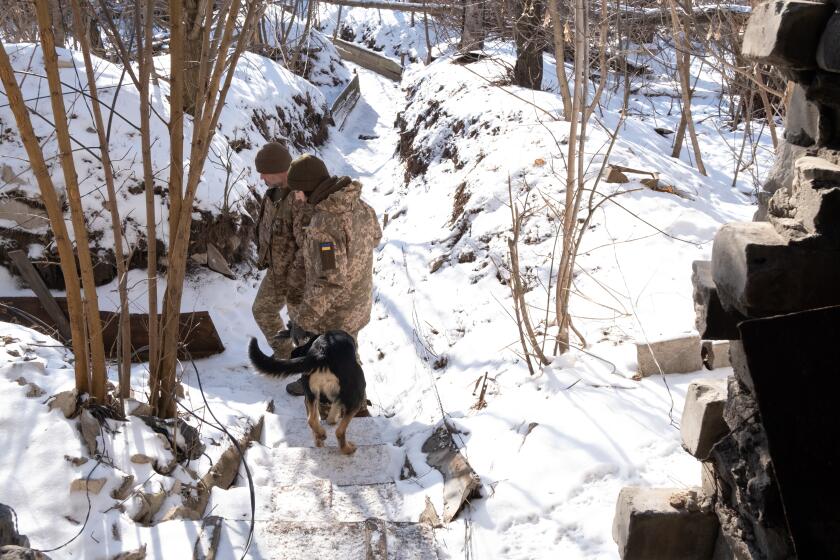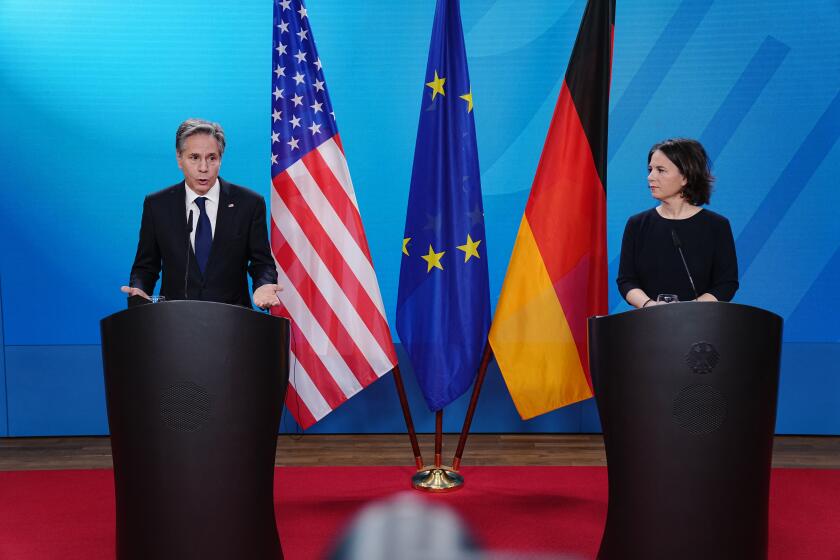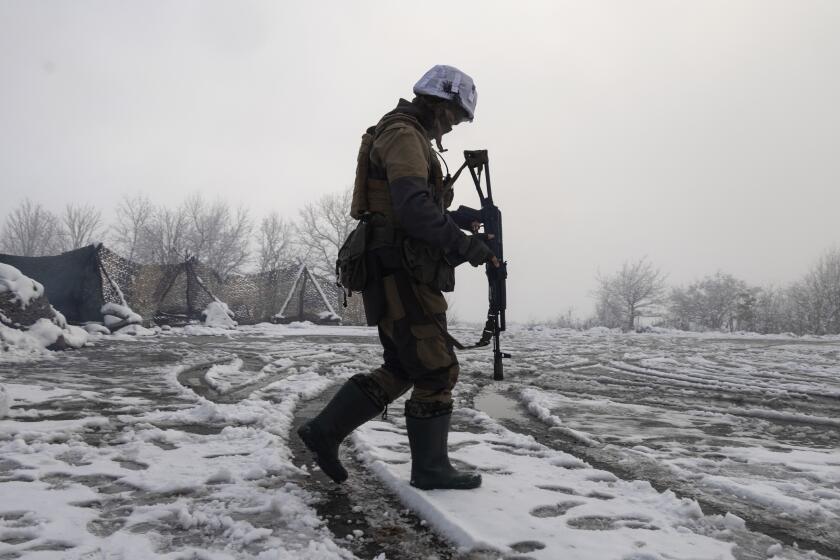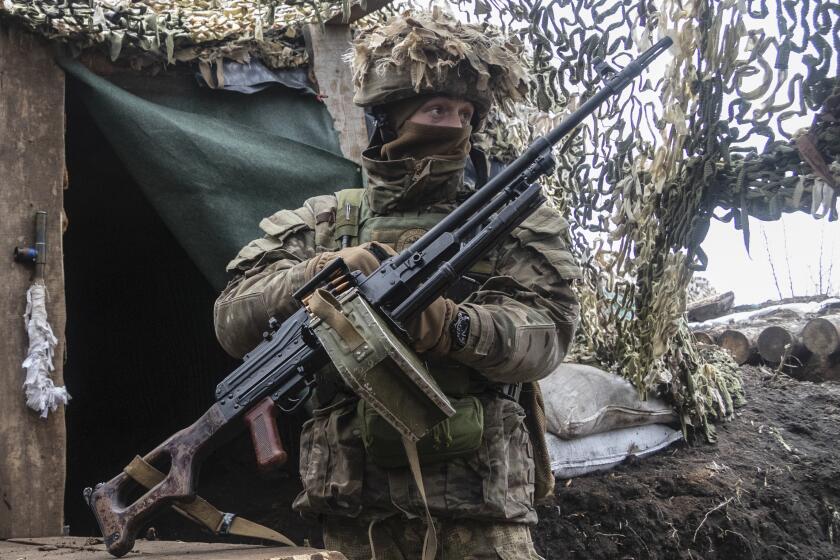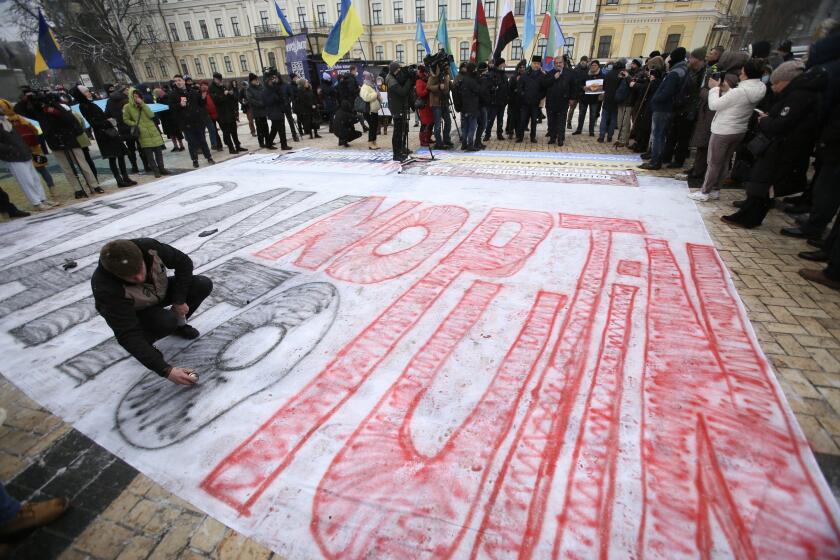U.S. response on Ukraine offers ‘little ground for optimism,’ Russia says
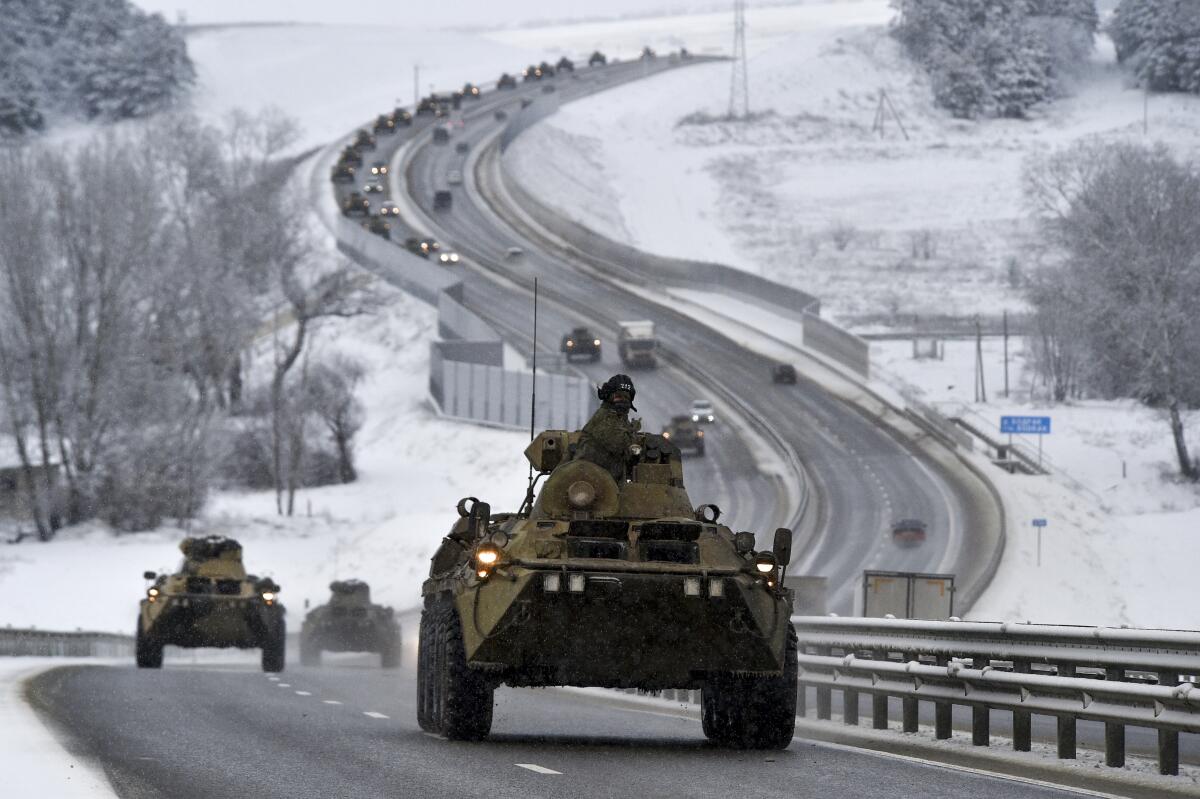
- Share via
MOSCOW — The Kremlin said Thursday that there was “little ground for optimism” in resolving the crisis over Ukraine after the U.S. rejected Russia’s main demands, but that dialogue was still possible.
Tensions have soared in recent weeks, as the United States and its NATO allies expressed concern that a buildup of about 100,000 Russian troops near Ukraine signaled that Moscow planned to invade its ex-Soviet neighbor. Russia denies having any such designs — and has laid out a series of demands it says will improve security in Europe.
But as expected, the U.S. and the Western alliance firmly rejected any concessions on Moscow’s main points Wednesday, refusing to permanently ban Ukraine from joining NATO and saying allied deployments of troops and military equipment in Eastern Europe are nonnegotiable. The U.S. did outline areas in which some of Russia’s concerns might be addressed, possibly offering a path to de-escalation.
“There is no change, there will be no change,” U.S. Secretary of State Antony J. Blinken said, repeating the warning that any Russian incursion into Ukraine would be met with massive consequences and severe economic costs.
All eyes are now on Russian President Vladimir Putin, who will decide how Russia will respond amid fears that Europe could again be plunged into war.
Kremlin spokesman Dmitry Peskov told reporters that the response from the U.S. — and a similar one from NATO — left “little ground for optimism.”
Slog of trench warfare in eastern Ukraine yields scenes reminiscent of World War I.
At the same time, he added that “there always are prospects for continuing a dialogue — it’s in the interests of both us and the Americans.”
White House Press Secretary Jen Psaki was circumspect when asked whether the Biden administration saw a sliver of hope in that the Russians said they would keep communications open even as they said that they lacked optimism.
“We don’t know if the Russians are playing games on diplomacy. We hope not,” Psaki said.
Russian Foreign Minister Sergei Lavrov noted that the U.S. response contained some elements that could lead to “the start of a serious talk on secondary issues” but emphasized that “the document contains no positive response on the main issue.” Those are the Russian demands for the non-expansion of NATO and that the alliance refrain from deploying weapons that may threaten Russia.
Lavrov said top officials will submit proposals to Putin. Peskov said the Russian reaction would come soon.
The evasive official comments reflect the fact that it’s Putin alone who will determine Russia’s next moves. The Russian leader has warned that he would order unspecified “military-technical measures” if the West refused to heed the demands.
As the U.S. seeks to present a united front on Ukraine, Germany has its own interests to safeguard in dealings with the Kremlin. Some other European states do as well.
Peskov added that Putin and President Biden would decide whether they need to have another conversation following two phone calls last month.
Biden is set to have a call with Ukraine’s President Volodymyr Zelensky later Thursday, according to Zelensky’s spokesman.
Ukrainian Foreign Minister Dmytro Kuleba said his government had seen the U.S. response before it was delivered to Russia and had no objections. He tweeted that it was “important that the U.S. remains in close contact with Ukraine before and after all contacts with Russia.”
Ukraine’s armed forces have struggled to improve their battle readiness since Russia annexed the Crimean peninsula in 2014.
On a visit to Denmark, Kuleba emphasized his country’s need to strengthen its defenses.
“This crisis is a moment of truth, and this is why we speak about weapons,” he said. “This is why we speak about economic sanctions. This is why we speak about the consolidated position of all of us, so that President Putin sees that there are no weak links in our defensive chain.”
German Foreign Minister Annalena Baerbock said during a parliamentary debate on Ukraine that her government was closely coordinating its policy with allies, with a range of options under consideration that could include action on the new Nord Stream 2 Russian gas pipeline to Germany.
While the diplomacy sputters on, so too do maneuvers that have escalated tensions. Russia has launched a series of military drills involving motorized infantry and artillery units in southwestern Russia, warplanes in Kaliningrad on the Baltic Sea, dozens of warships in the Black Sea and the Arctic, and Russian fighter jets and paratroopers in Belarus.
The North Atlantic Treaty Organization said it was bolstering its deterrence in the Baltic Sea region, and the U.S. ordered 8,500 troops on higher alert for potential deployment to Europe.
Amid the tensions, thousands of Ukrainians expressed their resolve to stand up to the Russian pressure under the hashtag #UkrainiansWillResist on Twitter and Facebook.
Ukraine’s leaders are seeking to reassure their jittery citizens that an invasion from neighboring Russia is not imminent, despite a troop buildup.
“No one will force Ukrainians to accept the Kremlin ultimatum,” wrote Andrii Levus, who initiated the online campaign.
As war fears mounted, Ukraine’s Interior Ministry organized training on acting in emergency situations, with an emphasis on dealing with explosives.
Beyond the fears of a Russian invasion in Ukraine, there also has been speculation that Moscow’s response could include military deployments to the Western Hemisphere.
While a senior Russian diplomat recently pointedly refused to rule out such deployments to Cuba and Venezuela, a top Putin associate expressed skepticism Thursday at that prospect.
“Cuba and Venezuela are aiming to come out of isolation and restore normal relations with the U.S. to a certain extent, so there can’t be any talk about setting up a base there as happened during the Soviet times,” Dmitry Medvedev, a deputy head of Russia’s Security Council, said in an interview with Russian media.
Breaking News
Get breaking news, investigations, analysis and more signature journalism from the Los Angeles Times in your inbox.
You may occasionally receive promotional content from the Los Angeles Times.
Although he accused the West of using Ukraine as a way to contain Russia, he somberly acknowledged that a Russia-NATO conflict “would be the most dramatic and simply catastrophic scenario, and I hope it will never happen.”
Russian Foreign Ministry spokesman Alexei Zaitsev reaffirmed Moscow’s denial of any intention to attack Ukraine, saying: “We consider even a thought about a war between our peoples unacceptable.”
As concerns rise about a possible Russian invasion, another conflict still simmers in Ukraine. In 2014, following the ouster of a Kremlin-friendly president in Kyiv, Moscow annexed Ukraine’s Crimean peninsula and threw its weight behind a separatist insurgency in the country’s eastern industrial heartland. Fighting between Ukrainian forces and Russia-backed rebels has killed more than 14,000 people, and efforts to reach a settlement have stalled.
Since the conflict began, Russia has been accused of sending troops and weapons to the separatists, which it denies. On Thursday, Peskov declined to comment on a proposal from the Kremlin’s main political party, United Russia, which suggested that Moscow respond to the delivery of Western weapons to Ukraine by sending arms to the rebels. He added that Putin was aware of the proposal but had no immediate reaction.
Stash food and cash, Facebook-unfriend Russia nationalists: yes. Learn that bomb shelter map: maybe. Ukraine hopes for best and readies for the worst.
Envoys from Ukraine, Russia, France and Germany met Wednesday to discuss a resolution to that conflict, reaching no visible progress but agreeing to hold another meeting in two weeks. Zelensky praised the talks as “constructive” and urged a quick meeting of the four countries’ leaders.
But Medvedev said that Moscow saw no point in talking to Zelensky, and expressed hope that Ukrainians would eventually become “weary of that bedlam and elect the leadership that would pursue policies ... aimed at normal economic relations with Russia.”
That comment follows a British claim that the Kremlin is seeking to replace Ukraine’s government with a pro-Moscow administration — an allegation Russia denied.
Associated Press writers Aamer Madhani in Washington, Yuras Karmanau in Kyiv, Jan M. Olsen in Copenhagen and Frank Jordans in Berlin contributed to this report.
More to Read
Sign up for Essential California
The most important California stories and recommendations in your inbox every morning.
You may occasionally receive promotional content from the Los Angeles Times.
